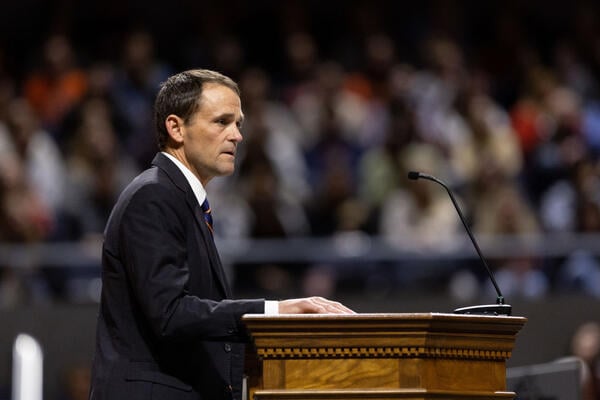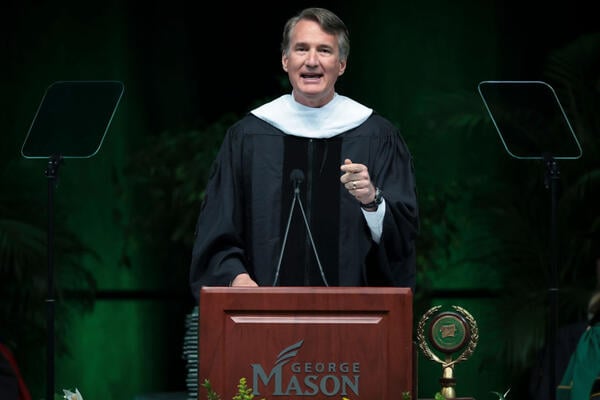Jim Ryan’s decision last month to step down as president of the University of Virginia in the face of pressure from the Trump administration drew renewed attention to the political appointees steering the public institution who will pick the next campus leader.
Multiple onlookers blamed Ryan’s resignation at least partly on the university’s Board of Visitors, which has been dramatically reshaped over the last three-plus years by Republican governor Glenn Youngkin’s appointments. Since taking office in 2022, Youngkin has stocked the board with former GOP lawmakers, Republican donors and members of the Jefferson Council, a conservative alumni group that called for Ryan’s ouster.
But UVA’s board isn’t the only one that has seen a dramatic overhaul. An Inside Higher Ed analysis shows that boards at public institutions across the state are heavy with GOP donors, former lawmakers and Trump officials, and members with ties to conservative think tanks. Tensions between conservative boards and faculty have prompted two recent no confidence votes and concerns over whether members who are ideologically aligned with Trump will protect universities in the administration’s crosshairs.
Now, a battle is brewing over who gets to serve on Virginia’s governing boards at a pivotal moment for higher education in the commonwealth.
A Battle Over Appointments
When Youngkin took office, he quickly focused on education-related issues, banning so-called “divisive concepts” in K-12 classrooms and purging “equity” from the state education system.
While the Democrat-controlled General Assembly has blocked some of Youngkin’s other efforts to overhaul education, he’s wielded board appointments as a tool to reshape higher education across Virginia, largely bypassing state lawmakers. His appointees have since pushed out university leaders, eliminated diversity, equity and inclusion programs, and taken aim at faculty members for teaching on topics such as race and gender.
Democrats in the General Assembly signed off on most of the appointments, even the controversial ones. But the Democrats started pushing back this year.
In January, the Democrats rejected former Trump officials Kenneth Marcus and Marc Short along with four other appointees—a move Youngkin blasted as “petty.” Later, they turned down former Virginia attorney general Ken Cuccinelli (who Youngkin appointed to the UVA board in March to replace Bert Ellis, who the governor removed due to his volatile conduct) and seven others.
Democrats argued that the appointees were “poor choices.”
“Historically, the governance of higher education in Virginia has not been nearly this political,” State senator and Democratic majority leader Scott Surovell told Inside Higher Ed.
Surovell said Democrats grew concerned by the actions of Youngkin’s appointees as they gained a majority on the university boards. For example, Virginia Military Institute declined to renew the contract of superintendent Cedric Wins, the first Black leader in VMI history. Wins, a VMI graduate, faced frequent criticism from alumni over diversity, equity and inclusion efforts that were introduced following allegations of a racist and sexist environment at the military school.
But when the Democrats on the Senate Privileges and Elections Committee rejected eight nominations for public university boards in a special session last month, the Youngkin administration refused to accept that outcome. The governor’s office has argued that those nominees need to be voted on by the full Senate and can continue to serve in the meanwhile.
Democrats then sued board representatives of George Mason University, Virginia Military Institute and UVA. The nine state senators who brought the lawsuit alleged that Youngkin “refused to recognize the rejection of those appointments by a coequal branch of government, in open defiance of the Constitution of Virginia and 50 years of tradition in the Commonwealth.” Plaintiffs asked the court to block appointees from serving on those boards.
A hearing in the case is scheduled for Friday.
Virginia Education Secretary Aimee Rogstad Guidera accused state Democrats of gamesmanship in a statement shared with Inside Higher Ed and argued that rejecting the recent slate of Youngkin’s board appointees could undermine the governance of public institutions.
“One of the strengths of the Virginia Higher Education system is the quality of citizens who choose to take time away from personal and professional endeavors to serve the Commonwealth as Visitors to our colleges,” she wrote. “The baseless attacks by Senate Democrats on these good peoples’ reputations may deter future leaders’ willingness to serve.”
And Youngkin’s office bristled at the notion that the governor has stocked the board with Republican donors and conservative political figures, arguing all appointees are highly qualified.
“The premise of your question is absurd—to diminish Governor Youngkin’s imminently qualified higher education board appointees as mere partisans is an insult to the citizens who willingly put in the time and effort to voluntarily serve our Commonwealth,” Press Secretary Peter Finocchio wrote in an emailed statement to Inside Higher Ed. “Governor Youngkin is proud to have appointed individuals who are distinguished alumni of our universities, respected business executives, and integral community leaders who have demonstrated experience overseeing complex budgets, running large organizations, and implementing long-term strategies.”
Concerns at GMU
Among Virginia’s public institutions, GMU’s board has likely attracted the most attention for its picks, which includes 10 former Republican officials, current and former Heritage Foundation employees—which had included Project 2025 co-author Lindsey Burke, who recently stepped down to join the Department of Education—and others with ties to conservative groups.
Although Youngkin’s appointees have featured multiple political firebrands, the appointment of donors is common. Ralph Northam, the Democratic governor who preceded Youngkin, appointed multiple Democratic mega donors who contributed to him. Northam’s appointees to the GMU board included six former Democratic officials. Two other Northam appointees served as legislative aides to Republicans earlier in their careers. (Governors, regardless of political affiliation, frequently appoint donors, though political activists are less common. One notable exception is Florida governor Ron DeSantis, a Republican, who has regularly appointed conservative activists and GOP political figures to university boards in recent years.)
Now, many professors question whether the board will meet the moment as GMU faces four investigations from the federal government spanning admissions and scholarship practices, alleged discrimination in hiring decisions, and claims the university has not adequately addressed antisemitism. Given the numerous connections between the Trump administration and George Mason’s Board of Visitors, some faculty members believe that the university is facing a series of coordinated attacks designed to oust GMU President Gregory Washington.
George Mason University President Gregory Washington.
Bill O’Leary/The Washington Post via Getty Images
“I think when you peel back the connections of all of these individuals, it’s hard to imagine that this is not orchestrated or coordinated,” said Bethany Letiecq, chair of GMU’s chapter of the American Association of University Professors, which passed a no confidence vote in the board Monday.
The AAUP chapter expressed support for Washington and condemned the board for “fail[ing] to support President Washington and George Mason University during this period of unprecedented and increasing federal scrutiny and political targeting,” according to a copy of the resolution.
GMU faculty senate chair Solon Simmons, who also serves as the faculty representative on the Board of Visitors, believes “this is a coercive action by the federal government” and that Mason is caught up “in a larger ideological agenda.” But Simmons is less critical of his fellow members.
Simmons said he hasn’t seen “bad faith actions from the board members,” in that they haven’t tried to micromanage faculty tenure cases or dictate what should be in the university curriculum, though he added they have raised concerns about what they believe shouldn’t be included. He also suggested that “they’re enacting their values and sometimes they’re enacting their biases.”
But he added that, in a purple state that has long been trending blue, the board seems politicized.
“They’ve been professional, but they bring a much more conservative point of view than you’d think would be typical of a swing state where you’re appealing to the median taxpayer,” Simmons said.
Letiecq, however, argues the board is packed with extremists who have targeted faculty members. One member, Sarah Parshall Perry, works for the conservative group Defending Education, which posted the syllabus for one of her classes online last year as an example of “indoctrination.” The organization took aim at the graduate level course titled “Critical Praxis in Education” because it included topics such as “white supremacy, family privilege, intersectionality, and gender affirming policies.” Following that post and coverage from conservative media about her research, Letiecq said she has received two death threats.
“Tell me how faculty can feel safe, not just to exercise their academic freedom, but safe in their personhood, when you have extremist board members siccing their organizations on us,” Letiecq said.
George Mason officials did not respond to a request for comment from Inside Higher Ed. However, the board has offered some limited statements about the federal investigations, committing to respond to the government’s request and noting its fiduciary obligation to ensure the university continues to thrive.
Fallout at UVA
Meanwhile, at UVA, questions are swirling in the aftermath of Ryan’s resignation, including what the board knew and what role it played. Answers, however, are in short supply.

Former University of Virginia President Jim Ryan.
Mike Kropf-Pool/Getty Images
After Ryan said he would resign, UVA’s faculty senate voted no confidence in the Board of Visitors, alleging they failed to protect “the university and its president from outside interference.” Faculty also accused the BOV of failing to engage the faculty senate in a “time of crisis” and demanded “a full accounting of the specific series of events, and actions taken by the board” that led to Ryan’s resignation.
Initially, the faculty senate intended just to censure the board. That escalated when board members refused to commit to “protecting the selection of the interim president and the [next] president of the university from outside influence,” said faculty senate chair Jeri Seidman. They also declined to share additional details with faculty about Ryan’s resignation.
Of the 17 appointed board members listed on UVA’s website, all have donated to Republican candidates and causes. Of those members, 11 have donated to Youngkin, including several who contributed hundreds of thousands of dollars to his gubernatorial campaign and associated political action committee. Other members also have Republican ties, such as Cuccinelli.
(Northam appointed multiple Democratic mega donors who contributed to him. He also appointed three former Democratic lawmakers to UVA’s board.)
And it’s not just faculty members pressing the board for more transparency. UVA’s board also reportedly ignored requests from 12 deans who asked to meet, noting the palpable concerns of students, faculty and staff, alumni, and other community members. The deans wrote that some donors are withholding pledges and new hires are reconsidering plans to work at UVA.
Seidman said the board has “not been terribly responsive to us,” though she noted legal issues have hampered its ability to meet. Given the legal question over whether Cuccinneli is a board member or not, she said the board could risk lawsuits by including or excluding him from meetings.
UVA officials did not respond to a request for comment.
Vacancy at VMI
At VMI, the Board of Visitors that declined to renew Wins’s contract includes major GOP donors.
Former board president Thomas Gottwald, whose term ended in June, donated $130,000 to Youngkin’s Spirit of Virginia PAC and $77,500 to his gubernatorial campaign. Other members include former Trump official, Kate Todd; former Youngkin adviser, Meaghan Mobbs; two former lawmakers—William Janis and Scott Lingamfelter, both Republicans–and failed GOP political candidate Ernesto Sampson.
(Northam, a VMI graduate, also appointed multiple members who contributed to his campaign.)

Former Virginia Military Institute Superintendent Cedric Wins.
Justin Ide/for The Washington Post via Getty Images
Although the rejection of Wins came immediately after a new swath of appointments, Board President James Inman (a minor Youngkin donor) denied they were given direction by the governor and emphasized members are committed to acting in the best interest of VMI.
“Members of the board recognize their responsibility to work across party lines with the governor, the administration, and the General Assembly to advance the critical mission and vision of the Institute. The VMI BOV has received no directives—binding or otherwise—from Governor Youngkin,” Inman wrote in an emailed statement shared by the university.
Other Appointments
Youngkin has made notable appointments at university boards across Virginia.
Some are national conservative figures such as Carly Fiorina who ran for president as a Republican in 2016 and was appointed to the James Madison University Board by Youngkin in 2023. Fiorina is joined on the JMU board by former Heritage Foundation and Trump Administration staffer Kay Coles James; David Rexrode, former executive director of the Republican Party of Virginia; and other appointees with direct ties to Youngkin or the GOP.
At Old Dominion University, Youngkin appointed Susan Allen, the wife of former Republican senator and Virginia governor George Allen. He also named Stanley Goldfarb to the board, a former University of Pennsylvania medical school dean and national advocate against gender-affirming care. However, Goldfarb was one of the rare Democratic rejections before this summer, which he claimed was because he had questions about the medical school curriculum.
Similar appointments dot multiple boards across the state.
Surovell said now that the partisan composition of Virginia boards has become clear, Democrats are vowing to take up reforms in the next legislative session. Likely reforms include changing the terms of board members so that no one governor can reshape an institution through such appointments over one term. He would also like to see board members wait to take their seats until they’ve been confirmed by the General Assembly. Currently, appointees may join boards after being named by the governor and while awaiting confirmation.
Surovell also thinks Democrats need to hold off on appointments until such reforms are in place.
“The governor has exposed some real weaknesses in our current system of higher educational governance, and we’re going to come back in January, and we’re going to reform the process,” Surovell said.


